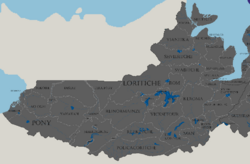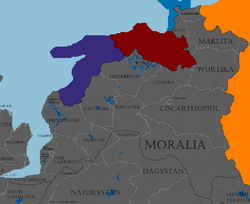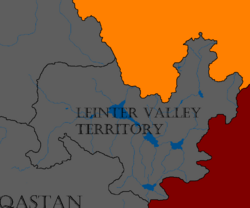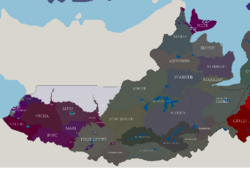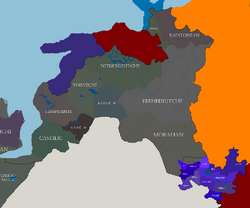Diutche: Difference between revisions
| Line 696: | Line 696: | ||
===Religion=== | ===Religion=== | ||
The majority religion in Diutche and Östendiutche is Kystiack, which is an Orthodox Trinitist faith. The religion is split into multiple metropolitan areas, which have been approved by the Patriarch. Currently, Diutche holds the Patriarchy proper, and Östendiutche holds a the Lesser Patriarchy, also known as a High Metropolitan, a rank of the church directly below the Patriarch. | |||
According to Church history, Trinitism was imported by Vapians missionaries. Through time, Trinitism became the dominant faith, displacing and removing many of the previous pagan beliefs. Eventually, both churches lost contact with each other, leading to differing doctrine and traditions. Once they came into contact again, both churches were angered at the differences, and excommunicated each other. | |||
Despite this, the relations between them healed over time, where both lifted the excommunications. With the change, many attempts to try and bring the churches together have failed, as no one could agree on historical canon due to record loss. However, the Krystiack Patriarchy has recognized the Rovigian Pope as a patriarchy within the Trinitist faith. | |||
===Education=== | ===Education=== | ||
Revision as of 17:38, 26 March 2024
The Grand Kingdom of Diutche Grōß Kōenigrejik von Diutche Kingdom of Kingstar | |||||||||||||||||||||||||||||||||||||||||||||||||||||||||||||||||||||||||||||||||||||||
|---|---|---|---|---|---|---|---|---|---|---|---|---|---|---|---|---|---|---|---|---|---|---|---|---|---|---|---|---|---|---|---|---|---|---|---|---|---|---|---|---|---|---|---|---|---|---|---|---|---|---|---|---|---|---|---|---|---|---|---|---|---|---|---|---|---|---|---|---|---|---|---|---|---|---|---|---|---|---|---|---|---|---|---|---|---|---|---|
| |||||||||||||||||||||||||||||||||||||||||||||||||||||||||||||||||||||||||||||||||||||||
The Kingdom of Östendiutche Kōenigrejik von Östendiutche | |||||||||||||||||||||||||||||||||||||||||||||||||||||||||||||||||||||||||||||||||||||
|---|---|---|---|---|---|---|---|---|---|---|---|---|---|---|---|---|---|---|---|---|---|---|---|---|---|---|---|---|---|---|---|---|---|---|---|---|---|---|---|---|---|---|---|---|---|---|---|---|---|---|---|---|---|---|---|---|---|---|---|---|---|---|---|---|---|---|---|---|---|---|---|---|---|---|---|---|---|---|---|---|---|---|---|---|---|
| |||||||||||||||||||||||||||||||||||||||||||||||||||||||||||||||||||||||||||||||||||||
The Leinter Valley Territory Kär Istahe Kant | |||||||||||||||||||||||||||||||||||||||||||||||||||||||||||||||||||||||||||||||
|---|---|---|---|---|---|---|---|---|---|---|---|---|---|---|---|---|---|---|---|---|---|---|---|---|---|---|---|---|---|---|---|---|---|---|---|---|---|---|---|---|---|---|---|---|---|---|---|---|---|---|---|---|---|---|---|---|---|---|---|---|---|---|---|---|---|---|---|---|---|---|---|---|---|---|---|---|---|---|---|
| |||||||||||||||||||||||||||||||||||||||||||||||||||||||||||||||||||||||||||||||
The Grand Kingdom of Diutche is a Semi-cnstitutional Monarchy, with Grand King Astro Skovi and Prime Minister Maria Von Swede as the heads of state. Diutche uses a system of checks and balances, whereas the King can send in bills for parliament and Veto bills passed by the parliament, and the Parliament can veto the Grand Kings military initiatives or his bills he introduces into the parliament.
The nation has a few neighbors, that being Östendiutche to the east, and Sarcaritche and Harl-Ombragen •Archiac: Gothika through the Leinter Valley Territory. Through Östendiutche, the nation borders the The Östenrejiker-Duestchen Union,Britanitche, Sarcaritche, and Harl-Ombragen
Etymology
The common name, ‘Kingstar’ comes from the nations capital, Kingstar. Kingstar is the strangrealic literal translation of the name Kōenigsterne, which derives from the term "Tros 'Kōenigse' Von Tehs 'Sternēs'", or The King of the stars. The Grand Kingdom of Diutche, the country that the Kingstar Kingdom is subservient to, comes from the word ‘people’ in Diutchelies, whereas Östendiutche means East Diutche, or Eastern People. The letters -liche typically denotes people of a country, as in Diutcheliche or Östeliche, and conversely, -itche denotes a land of a people, typically a state within a country, but is sometimes found in nation names in Diutchelies. The -lies is a suffix meaning ‘speak’, meaning Östelies means East(ern) speak (speech) and Diutchelies means Diutche (People) speak (speech).
History
The Era of Migrations
In the standard Strangrealic year of 141 BCE, the land known as Diutche had begun seeing migrations of Germanic tribes from the east, from Östendiutche, and from the southern mountains. The original inhabitants were the Nekoilites, a large ethnic group consisting of humans with catlike features, such as ears and tails. Originally the majority, the Nekoilites were gradually overtaken by the Germanic tribes, which would later begin to merge and form the protodiutcheliche population in 128ce. By 216ce, the eastern portion of the region was fully Germanised, where the Nekoilite population were either assimilated into minority groups, or pushed out entirely. By this time, many states had begun forming out of tribes and begun expanding. The two most prominent were the Starcian petty kingdom in the east, and the Nekoilite Shojogate in the west.
Consolidation of States
Being the two largest states in the region, it created a large rivalry between the two states. By 221ce, the west and east respectively fell into their dominion, where tensions would boil over and the first war between the two countries, and the first major conflict to befall the region, would begin.
The First Starcian-Shojogate War
Within months of the year, Starcia began border incursions along the northern border, capturing a few towns. Angered, the Shojogate King,
Geography
Climate
Environment
Politics and Government
Military
Foreign Relations
Economy
Energy
Industry
Infrastructure
Transport
Demographics
The people of Kingstar are of multiple cultures, ethnicities, and some local faiths. Issues like LGBTQ is completely legalized by the federal government, along with local state religions differing from the national religion.
Population
Diutche
| Ethnic Group | Culture | Population % | Population (Million) | (First) Language | Religion |
|---|---|---|---|---|---|
| Diutcheliche | Skovin | 7% | 8.4 | 100% Diutchelies | Krystiack |
| Diutcheliche | Karien | 3.4% | 4 | 42% Karienlies, 12% Starklies, 46% Diutchelies | Krystiack |
| Diutcheliche | Starkian | 8.7% | 10.4 | 46% Starklies, 53% Diutchelies | Krystiack |
| Diutcheliche | High Icocan | 1.1% | 1.6 | 63% Icocalies, 37% Diutchelies | Krystiack |
| Diutcheliche | Low Devite | 4.9% | 5.8 | 64% Divoilies, 36% Diutchelies | Krystiack |
| Diutcheliche | High Devite | 3.9% | 4.7 | 78% Divoilies, 22% Diutchelies | Krystiack |
| Diutcheliche | Lorite | 4.5% | 5.4 | 61% Lorlies, 12% Divoilies, 4% Starklies, 23% Diutchelies | Krystiack |
| Diutcheliche | Mittles-Starkian | 6.1% | 7.3 | 63% Starklies, 37% Diutchelies | Krystiack |
| Diutcheliche | Schviesen | 2.1% | 2.5 | 22% Schvielies, 78% Diutchelies | Krystiack |
| Diutcheliche | Svabiche | 2.9% | 3.5 | 12% Starklies, 24% Shvielies, 34% Diutchelies | Krystiack |
| Diutcheliche | Svediche | 5.2% | 6.2 | 32% Starklies, 68% Diutchelies | Krystiack |
| Diutcheliche | Vestioc-Castilic | 1.2% | 1.4 | 32% Castilies, 68% Diutchelies | Krystiack |
| Diutcheliche | Kareische | 1.5% | 1.8 | 53% Menscher, 47% Diutchelies | Krystiack |
| Diutcheliche | Maniliche | 0.8% | 0.9 | 82% Menscher, 18% Diutchelies | Krystiack |
| Diutcheliche | Konick Icocan | 2% | 2.4 | 54% Icocalies, 46% Diutchelies | Krystiack |
| Diutcheliche | Rejike Icocan | 1.3% | 1.6 | 73% Icocalies, 27% Diutchelies | Krystiack |
| Diutcheliche | Polich-Baska | 0.5% | 0.6 | 63% Polies, 34% Baskalies, 3% Diutchelies | Krystiack |
| Neïte-Diutcheliche | Skoïte | 3% | 3.6 | 34% Skïlies, 21% Neïlies, 45% Diutchelies | Krystiack |
| Nekoilite | Neïte | 8.5% | 10.1 | 100% Neïlies | Krystiack |
| Nekoilite | Bari | 0.6% | 0.7 | 100% Divoilies | Krystiack |
| Nekoilite | Neko | 1.4% | 1.7 | 100% Divoilies | Krystiack |
| Nekoilite | Veru | 1.2% | 1.4 | 100% Divoilies | Krystiack |
| Nekoilite | High Baren | 0.3% | 0.3 | 100% Barrik | Nekïolack |
| Nekoilite | Mittles-Baren | 0.5% | 0.6 | 100% Barrik | Nekïolack |
| Nekoilite | Low Baren | 0.8% | 0.9 | 100% Barrik | Nekïolack |
| Nekoilite | Mari | 0.6% | 0.7 | 42% Ianï, 37% Pontchï, 21% Oskï | Nekïolack |
| Nekoilite | Iano | 5.1% | 6.1 | 73% Ianï, 27% Oskï | Nekïolack |
| Nekoilite | Drinn | 1.2% | 1.4 | 26% Divoilies, 74% Pontchï | Nekïolack |
| Nekoilite | Myri | 1.6% | 1.9 | 100% Myrï | Nekïolack |
| Nekoilite | Ponï | 3.5% | 4.2 | 81% Pontchï, 12% Oskï, 7% Nakï | Nekïolack |
| Nekoilite | Oscha | 4.7% | 5.6 | 93% Oskï, 7% Domican | Nekïolack |
| Nekoilite | Nachil | 2.6% | 3.1 | 63% Nakï, 28% Domican, 9% Oskï | Nekïolack |
| Nekoilite | Poys | 1% | 1.2 | 11% Poï, 70% Domican, 19% Oskï | Nekïolack |
| Nekoilite | Domican | 6.1% | 7.2 | 89% Domican, 11% Oskï | Nekïolack |
Östendiutche
| Ethnic Group | Culture | Population % | Population (Million) | (First) Language | Religion |
|---|---|---|---|---|---|
| Diutcheliche | Vestioc-Castilic | 2.9% | 2 | 21% Castilies, 43% Diutchelies, 36% Östelies | Krystiack |
| Östeliche | Castilic | 11.3% | 7.6 | 32% Castilies, 68% Östelies | Krystiack |
| Östeliche | Hempshirite | 8.8% | 5.9 | 24% Castilies, 27% Hymlies, 49% Östelies | Krystiack |
| Östeliche | Kaisiche | 1.7% | 1.2 | 12% Castilies, 43% Hymlies, 45% Östelies | Krystiack |
| Östeliche | Yorviche | 5.2% | 3.5 | 42% Hymlies, 68% Östelies | Krystiack |
| Östeliche | Neiderdiutche | 19.2% | 12.9 | 72% Neiderlies, 28% Östelies | Krystiack |
| Östeliche | Karviche | 8% | 5.4 | 14% Neiderlies, 12% Hymlies, 74% Östelies | Krystiack |
| Östeliche | Saxic | 3.1% | 2.1 | 86% Saxlies, 11% Balstoner 3% Östelies | Krystiack |
| Östeliche | Balstonian | 8.9% | 6 | 32% Balstoner, 68% Östelies | Krystiack |
| Östeliche | Ebendiutche | 17.9% | 12 | 100% Östelies (Ebenlies) | Krystiack |
| Östeliche | Moralian | 11.6% | 7.8 | 57% Moraler, 43% Östelies | Krystiack |
| Tieermanschen | Val | 0.8% | 0.6 | 100% Northern Tierrmanschelies | Tieeranimalism |
Leinter Valley
| Ethnic Group | Culture | Population % | Population (Million) | (First) Language | Religion |
|---|---|---|---|---|---|
| Tieermanschen | Val | 2.3% | 0.3 | 100% Northern Tieermanschelies | Tieeranimalism |
| Tieermanschen | Neisin | 8.4% | 1.1 | 100% Northern Tieermanschelies | Tieeranimalism |
| Tieermanschen | Mui | 4.6% | 0.6 | 100% Northern Tieermanschelies | Tieeranimalism |
| Tieermanschen | Lieri | 10.7% | 1.4 | 100% Northern Tieermanschelies | Tieeranimalism |
| Tieermanschen | Niumi | 6.9% | 0.9 | 100% Western Tieermanschelies | Tieeranimalism |
| Tieermanschen | Itya | 3% | 0.4 | 100% Western Tieermanschelies | Tieeranimalism |
| Tieermanschen | Bui | 6.1% | 0.8 | 100% Eastern Tieermanschelies | Tieeranimalism |
| Tieermanschen | Thropen | 16.1% | 2.1 | 100% Central Tieermanschelies | Tieeranimalism |
| Tieermanschen | Genhsen | 10.7% | 1.4 | 100% Central Tieermanschelies | Tieeranimalism |
| Tieermanschen | Hera | 6.9% | 0.9 | 100% Central Tieermanschelies | Tieeranimalism |
| Tieermanschen | Niami | 9.2% | 1.2 | 100% Southern Tieermanschelies | Tieeranimalism |
| Tieermanschen | Lycan | 14.6% | 1.9 | 100% Eastern Tieermanschelies | Tieeranimalism |
Religion
The majority religion in Diutche and Östendiutche is Kystiack, which is an Orthodox Trinitist faith. The religion is split into multiple metropolitan areas, which have been approved by the Patriarch. Currently, Diutche holds the Patriarchy proper, and Östendiutche holds a the Lesser Patriarchy, also known as a High Metropolitan, a rank of the church directly below the Patriarch. According to Church history, Trinitism was imported by Vapians missionaries. Through time, Trinitism became the dominant faith, displacing and removing many of the previous pagan beliefs. Eventually, both churches lost contact with each other, leading to differing doctrine and traditions. Once they came into contact again, both churches were angered at the differences, and excommunicated each other. Despite this, the relations between them healed over time, where both lifted the excommunications. With the change, many attempts to try and bring the churches together have failed, as no one could agree on historical canon due to record loss. However, the Krystiack Patriarchy has recognized the Rovigian Pope as a patriarchy within the Trinitist faith.


